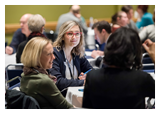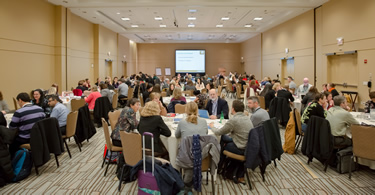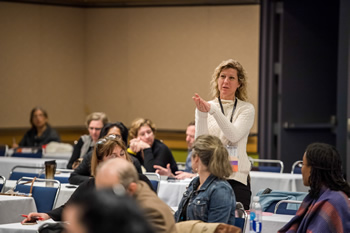|
 TESOL leaders are in a unique position to both learn from the annual Convention and to be a part of what makes it run smoothly. A few TESOL leaders share their most useful and practical takeaways from TESOL 2018 in Chicago, Illinois, USA. TESOL leaders are in a unique position to both learn from the annual Convention and to be a part of what makes it run smoothly. A few TESOL leaders share their most useful and practical takeaways from TESOL 2018 in Chicago, Illinois, USA.
Takeaway: The New TESOL Communities of Practice
Name: Alex D. Monceaux
TESOL position: MWIS Chair-Elect
Context: Higher Education
Location: Texas, USA
For the past several years I have been honored to be “sent” to the TESOL Convention. This year I attended the Convention in a bit different capacity—as incoming chair for MWIS—and gained a clearer understanding of the extent to which TESOL is seeking to engage members. To leverage the recent organizational changes, TESOL leadership was shifting the association’s focus from an annual Convention to the growth of Communities of Practice (COPs) growing out of the existing functioning interest sections. While the change is scary for many, one profound realization the potential and obligation IS leaders now have to engage and involve their members in the work of their field, a task that should strengthen relationships and promote research and study at a grassroots level that an international Convention could never achieve. For those in the field, this is an exciting shift as teachers, researchers, and leaders in the field will now have multiple opportunities and venues to present their ideas, network, and share their experience in bite-sized portions. These COPs will offer members a place to network, gain insight, knowledge, and skills throughout the year; I am very excited about these new opportunities.

TESOL leaders convene at the Leadership Forum.
Takeaway: TESOL’s 6 Principles for Exemplary Teaching of English Learners
Name: Katherine Lobo
TESOL position: Chair of Convention in Chicago; newly appointed member of TESOL’s Board of Directors
Context: Full-time ESL teacher in a public high school; adjunct professor in higher education
Location: Massachusetts, USA
This year, I wanted to learn more about the social-emotional, culturally based factors that impact classroom and school climate. Expanding my knowledge in these areas will help me to plan better lessons that are better suited to my students and better take into account their prior learning experiences and contexts. Also, my classroom management and management of cooperative learning activities will hopefully will be more effective and empathetic. I attended several sessions that fit the bill and was able to purchase a book that will extend my learning until TESOL 2019 in Atlanta.
I was not aware of TESOL’s 6 Principles for Exemplary Teaching of English Learners until they were unveiled at the Convention. I attended several sessions regarding the 6 Ps and had a good look at the Quick Guide while at the Convention. Since that time, I have read the book and I am very excited to share it with the teachers with whom I work who are struggling to meet the needs of the growing population of English learners in the mainstream classroom.
Takeaway: Ensuring Unbiased and Consistent Speech Ratings
Name: Veronica G. Sardegna
TESOL Position: SPLIS Past Chair and Chair
Context: Higher Education
Location: Pittsburgh, Pennsylvania, USA
From “Research-Based Assessment Practices for ITA Programs” (the ITAIS academic session with Pollock, Samuel, Sardegna, and Wei), I discovered the benefits and pitfalls of using standardized oral tests and human raters for assessing international students’ ability to teach at American universities. Dr. Pollock’s and Dr. Wei’s research underscored the need to train and calibrate raters rigorously to prevent biased and inconsistent ratings. I contributed to this presentation with empirical support for a pronunciation assessment model that creates opportunities that promote and support learners’ English pronunciation improvement through self-assessments, self-regulation, and reflections on learning. From “Listening Instruction for L2 Learners: Research and Strategies” (the SPLIS academic session with Nemtchinova, Reed, and Siegel), I learned the importance of increasing learners’ sensitivity to pitch movements that lead to some sort of implicature (i.e., implying a meaning beyond the literal sense of the phrase). To raise learners’ awareness of implicatures, Dr. Reed proposed giving students strategy instruction and contextualized listening practice. A key takeaway from these two featured academic sessions is the crucial role of the teacher in ensuring unbiased and consistent speech ratings, and facilitating self-directed language learning through the provision of expert knowledge, strategy instruction, and self-assessments.

An interest section leader speaks at the IS Assembly.
Takeaway: Inspiration
Name: Carter A. Winkle, PhD
TESOL position: SRIS Co-Chair
Context: Higher Education / Teacher Education / Research / Advocacy
Location: Barry University, Miami Shores, Florida (USA)
Perhaps the single most useful learning or take-away from the TESOL Convention has been the reifying knowledge that our profession is peopled by beautifully diverse scholars and practitioners who care deeply about not only their students’ language development, but also for their personal wellbeing. TESOLers—I find—are exceptional advocates for students in ways we do not always see in the “general” population of instructors or teachers. I am so pleased that we have been seeing more and more practitioner and academic workshops and presentations at the Convention that explicitly guide both beginning and seasoned teachers in the ways they can mindfully support students, themselves, and colleagues who may feel on the margins of a socially unjust world owing to home culture, race, L1 or language variety, sexuality, religion, gender identity, or any number of “defining” and intersecting human characteristics. I left the Convention energized and inspired knowing that language teachers can change the world.
Takeaway: How to Maintain a Professional Balance
Name: Dr. Christine Sabieh
TESOL position: CALL-IS Chair
Context: Higher Education
Location: Lebanon
Maintaining a balance between outreach, stress, collaboration, and professional role expectations was the single most useful strategy I learnt at TESOL as a CALL-IS leader. The following helped me achieve this balance:
- Leadership meetings, workshops, and forums planted the seeds of collaboration that would grow across the coming year.
- Mentors in my first year as a leader modeled the dive into the sea of IS collaboration, and in my second year I acted as mentor to my co-chairs-elect.
- Opportunities for outreach to other ISs helped during the stressful planning of IS panel collaborations (along with academic and hot topic sessions).
The contexts were fertile, and I’m happy to report: Balance strategy did me proud!
Takeaway: Response to Intervention and Multi-Tier System of Supports (RTI and MTSS)
Name: Jessica Burchett
TESOL position: Elementary Education Interest Section (EEIS) Chair
Context: K–12
The academic session for EEIS consisted of panelists that were experts in providing professional development to districts using the RTI/MTSS process with English learners. They all came from different perspectives, but found ways to differentiate language/culture from learning disabilities. I found the process that each went through similar, but was able to see how they were able to adjust the process for their particular programs. Some of them showed how they used the Acculturation Quick Screen and the Sociocultural Checklist by Catherine Collier. This made it very practical. This analysis of process made it possible for me to see both the strengths and weaknesses of my program and gave me insight on how to mentor others who are struggling in this area.
|